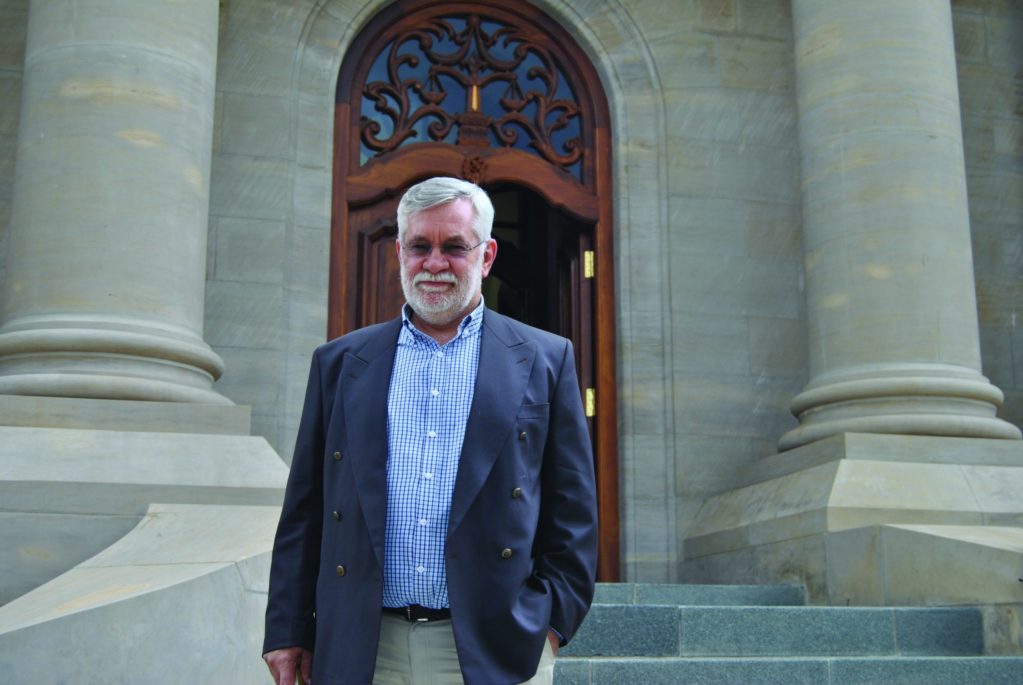It’s a sunny day in the judicial capital of South Africa, Mangaung—formerly known as Bloemfontein—but inside the country’s highest court of appeal, the temperature is rising. Media conglomerate Media24, with one of its specialist journalists, Jan de Lange, are first respondents to a case against one of the biggest mining companies in the world, BHP Billiton.
The London Stock Exchange-listed company is appealing a decision by the Gauteng High Court, which declared that they should divulge the details of their contract with Eskom. The contract might reveal that BHP Billiton is actually paying very little for electricity and that the public is subsidizing their consumption.
It is big money. In his application to the High Court, de Lange mentioned, among other things: “It appears that the contracts are responsible for at least part of Eskom’s R3.2 billion ($368 million) operating loss for the year ended March 31, 2009 and the whole of its projected loss on embedded derivates of R9.5 billion ($1.1 billion) going forward.”.
It all started in 1995 after de Lange joined Media24 as a specialist reporter in the business division, Sake24.
“It was the first story I went out to when we made the trip to Eshowe for the opening of a power station; it was here that they announced that Hillside and Gencor were to become Eskom’s biggest private client. When it came to the question and answer section of the presentation, we wanted to know how much Gencor was paying for electricity. We were not given an answer. I then started following this issue closely because you could feel that something was not right,” de Lange says.
Loading...
Gencor was, at the time, one of South Africa’s biggest mining companies. Under its control it had, amongst others, Impala Platinum, Goldfields and Billiton. The company was unbundled and Billiton changed its focus to non-precious metals under the leadership of former Gencor head, Brian Gilbertson.
“At that time Gencor was one of South Africa’s major companies. We were looking for growth opportunities and we identified this aluminum opportunity arising from the country’s surplus electricity at the time,” Gilbertson says from London, where he runs a resources company.
“In order for us to invest $1 billion in South Africa and over $1.5 billion into Mozambique we needed to be confident about the power supply. As part of our risk mitigation, we wanted to know that if the price of aluminum collapsed we [wouldn’t] lose all our money invested in the project and so we did something new in South Africa, which was to link the power price from Eskom to the price of aluminum in the market.”
“This meant that if the aluminum price went down, the cost of our power would go down; if the aluminum price went up, the price would go up. In this way our project would be more viable. Even President Mandela was backing the deal because we were using it to showcase to the world that South Africa would be able to build projects of this size and nature.”
In those days Eskom had a surplus of cheap electricity but this was soon to change when economic and population growth surpassed anticipated figures. BHP Billiton was purportedly doing well as a result of the cheaper tariffs they were charged.
De Lange’s investigations revealed that while the general public was hit hard by tariff increases subsequent to blackouts, BHP Billiton might have been gaining benefit through lower electricity prices.
In 2009, he went to court to try to obtain the details of the contract between Eskom and BHP Billiton.
In August last year, de Lange finally won a ruling in the Gauteng High Court in Johannesburg, which obliged Eskom to release the contract details. Eskom was willing to abide by the ruling. BHP Billiton was not and appealed.
“We have contracts with our customers and those contracts are confidential. The reason Eskom originally contested Jan de Lange’s case was that the contracts were confidential. When we lost the case we agreed to the courts findings,” says Eskom spokesperson, Hilary Joffe.
Eskom has since gone to the National Energy Regulator of South Africa (Nersa) to seek a renegotiation of the electricity supply contract for the Hillside and Bayside smelters after the Mozal Smelter (in Mozambique) deal was successfully renegotiated along with Scorpion Zinc in Namibia.
In the Mangaung courtroom, the two opposing advocates are exploring legal issues and the technical loopholes of each other’s cases.
Advocate Frank Snyckers, on behalf of BHP Billiton, states that his client is unwilling to reveal the details of the case.
“Aluminum pricing information is crucial to keep away from competitors,” he says.
It was revealed that BHP Billiton employs around 1,600 people between the two smelters. Each smelter uses at least 500MW of electricity per year. A large city like Mangaung only uses 400MW. BHP Billiton also uses around 6% of the country’s total electricity consumption.
After four hours of legal sparring, Justice Mthiyane reserved judgment for a later date.
Managing director of EE Publishers, Chris Yelland, was one of only five people in the court’s public gallery today and he is a worried man.
“An Appeal Court is looking at obscure technical issues of a legal nature, which are being used to try and overturn a judgment of the High Court. For me, as a non-lawyer, I find this frustrating. Issues of the rights of South African public are being ignored. It is conceivable that Media24 will lose their case and if so, I hope they will take it to the Constitutional Court,” he says.
I ask de Lange if he will indeed continue fighting if he loses this round. “Of course,” he says, with a smile.
Loading...
